In a competitive social media landscape, standing out of the crowd and reaching your target audience can be tricky. With access to around 4.59 billion daily active users across Facebook, Instagram and Messenger, advertising on Meta can give brands the opportunity to get their messages to the right people in a fun and interactive way.
Let’s take a look at what meta advertising is, how it works, how to get started and what advantages and disadvantages Meta has over other online advertising techniques.
What is Meta advertising?
Meta search advertising helps you reach people based on location, age, gender, interests, education and more, with regular updates on how well your ads are performing.
Advertising on Meta allows you to tailor your campaigns to specific goals, which include the different levels of the marketing funnel, as you can see below: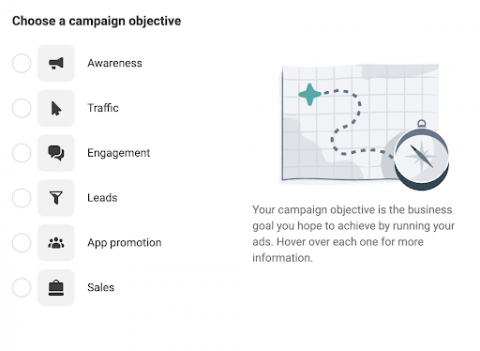 If you choose to advertise on Meta, you will have the option to place your ads in seven areas across Facebook, Instagram, Audience Network, and Messenger. Placements depend on your chosen objective and include:
If you choose to advertise on Meta, you will have the option to place your ads in seven areas across Facebook, Instagram, Audience Network, and Messenger. Placements depend on your chosen objective and include:
- Feeds
- Stories and Reels
- In-stream
- Search
- Messages
- In-article
- Apps and sites
There are two methods for choosing your placements:
Advantage+ placements
This recommended default option will allow Meta’s delivery system to allocate budget across multiple placements based on where your meta advertisement are likely to perform best.
Manual placements
Manually choose your placements. There are seven placements on offer and each has different areas. Your ads may not be eligible for all of them, depending on your advertising objective.
This section will allow you to be much more targeted, and give you the option to choose which platforms, devices, and operating systems your ads appear on. For example, if you just wanted to show your ads on Instagram stories, for users using iOS devices only, this makes it possible.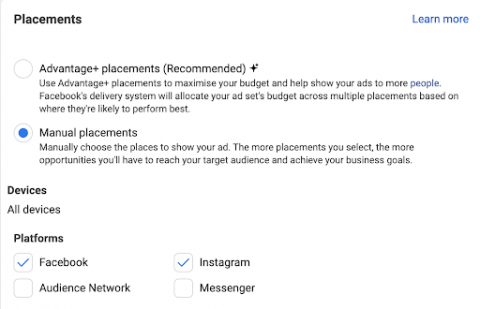
Wide customer reach
Facebook continues to be the number one social network when it comes to reach, with over 2.9 billion monthly active users. Instagram and Messenger offer another almost 2.5 billion users.
If you’re looking to reach the masses with your messaging, then Meta is the best place to do this, especially with its diversity of ages and demographics.
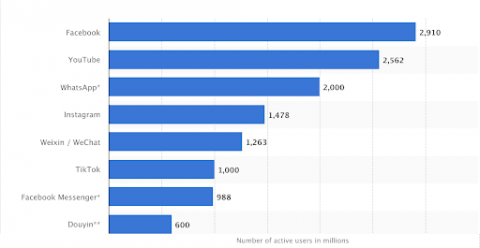 (source: Statistica)
(source: Statistica)
Advanced targeting and placement options
Over the years Meta has made its targeting and placement options more sophisticated.
You can use platform data to target by age, gender, interest and behaviours. You can also use owned data to create lookalike audiences or use audience lists for account-based marketing (ABM).
Additionally, you can also create custom audiences, such as site visitors, by installing Meta Pixel code to your website to remarket to those who are already familiar with your brand.
In addition to the above, Meta offers Advantage Detailed Targeting and Advantage Custom Audience, both of which allow for an expanded reach and improved performance.
Alongside advanced targeting, you can also benefit from the various ad placements Meta has to offer. You can choose to be as granular as you like or you can use Advantage+ placements to allow Meta to optimise for best results.
The targeting options, alongside the various campaign objectives you can choose from, enable you to have a full funnel approach: from reaching new audiences for brand awareness, to pushing them down the funnel to drive leads and sales.
Measurement and reporting
Meta’s dashboard allows you to monitor your campaigns and ads regularly.
You can view top-level metrics like spend, results and click-through rates, or go granular to see quality ranks and frequency. Additionally, you can also track who converts on your website as a result of viewing your Meta ads by installing a Meta pixel on your site.
To implement a pixel, simply navigate to the Facebook Pixel tab in Ads Manager and click “Create a Pixel”. Follow the instructions on screen, then add the Facebook Pixel base code to every page on your website, send instructions directly to your development team, or integrate the process with Google Tag Manager.
Creativity
In today’s world, advertisers are constantly fighting for user attention. Immersive ad-sets like Meta’s instant experience ads mean that users can be instantly transported to an app-like brand experience.
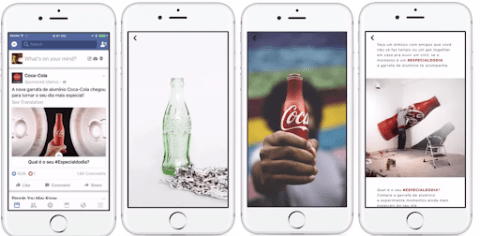
The full-screen interactive concept allows brands to tell a story that delivers on engagement, whilst providing an opportunity to showcase content marketing pieces that may otherwise be lost on a website.
Cost
In addition to all the above, Facebook remains the second cheapest social platform to advertise on. Whilst Twitter is the cheapest, the two are poles apart in reach and targeting options.
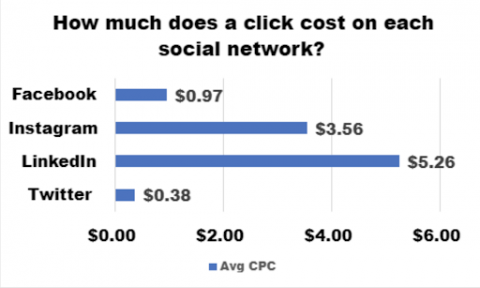
(source: Brandwatch)
We’ve written a guide on how to improve your Facebook relevance score for cheaper Facebook ads if you’re looking to advertise on Facebook.
What are the disadvantages of Meta advertising?
You can’t advertise everything
Some sectors simply aren’t allowed to advertise on Facebook. This is to ensure that people using Facebook enjoy a safe user experience.
Before adverts appear on Facebook they go through a strict review process, which in some instances can take up to 24 hours. So if you’re thinking of advertising your dodgy offerings, think again.
You can learn more about Facebook’s Advertising Policies here.
Granular targeting is becoming a thing of the past
With the increasing restrictions on data collection and improved data privacy laws, granular targeting is slowly becoming an outdated concept.
Although Meta is not the only platform facing the brunt end of data restrictions, it is heavily dependent on audience targeting. The inability to narrow the audience can often mean longer testing periods and slightly wasted spend.
A/B testing is not Meta’s strongest point
Unlike platforms like LinkedIn, Meta doesn’t allow for features like ad rotation.
Therefore, A/B testing can be a bit difficult on Meta. While it does have a built in A/B test option, it would take a long time to arrive at statistically significant results if your ad spend is not large enough.
Competition
The increasing number of businesses using Facebook advertising means the likelihood of your advert standing out vastly diminishes.
Catching people’s attention and getting your ad noticed amongst updates from their friends can be difficult – it requires creative ad-sets which can come at an additional resource cost.Still not sure whether Meta advertising is for you or need some help getting started? Get in touch with our paid advertising team who’ll be happy to talk you through what’s best for your business.




